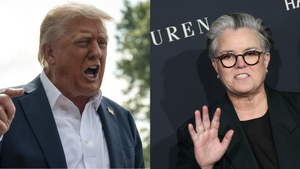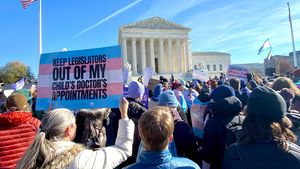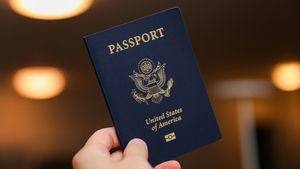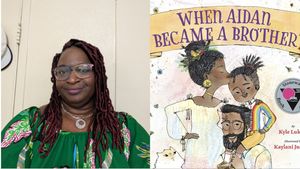Entertainment
CONTACTAbout UsCAREER OPPORTUNITIESADVERTISE WITH USPRIVACY POLICYPRIVACY PREFERENCESTERMS OF USELEGAL NOTICE
© 2025 Pride Publishing Inc.
All Rights reserved
All Rights reserved
By continuing to use our site, you agree to our Privacy Policy and Terms of Use.
Sam Nazarian, a muscular Iranian billionaire, strode through the Spike, a gay bar in Los Angeles known for late-night cruising. Exiting through the back door into a dark alley, he settled into the back of his chauffeured SUV, which was tricked out with satellite everything, remembers David Cooley, a corn-fed type from Ohio who approached the car. Then, lowering his window, Nazarian made Cooley a proposition that men have been making to one another since at least ancient Rome. Cooleys response? Im not for sale.
Nazarian, a film producer and nightlife entrepreneur whose company, SBE Entertainment Group, owns a number of restaurants, bars, and hotels, including the Sahara in Las Vegas, is straight. His interest in the Spike that night was purely financial -- hed been thinking of buying it -- but he saw an even better business opportunity when he recognized Cooley, the owner of the Abbey, West Hollywoods best-known gay bar and restaurant -- a 16,000-square-foot indoor-outdoor hodgepodge of ecclesial ephemera (a salvaged church pulpit is the DJ booth) without equal in a notoriously fickle market. Nazarian made an offer on the spot.
Cooleys initial protest was the opening gambit in a negotiation that ended last year, when he sold 75% of his stake in the Abbey to SBE for an undisclosed sumthough he admits it was a life-changing amount of money. (Most street gossip estimates the sale to be worth $20 million.) In partnership with SBE, Cooley intends to build Abbeys in cities across the country, and has spent much of the past year scouting locations including San Diego, Phoenix, Miami, New York City, Chicago, Atlanta, San Francisco, and Las Vegas; the plan is for the first new Abbey to open in Chicago within a year.
Bristling at the notion that hes creating a chain of Abbeys -- This is not T.G.I. Fridays, he sniffs -- Cooley points out that the business will be not franchised but wholly owned by his partnership with SBE. Cooley prefers to describe his current project as taking the Abbey national or replicating the soul of the Abbey. He embarks on this quest even as the gay nightlife industry seems to be in steep decline. During the past year, clubs such as New Yorks Roxy and Bostons Avalon have closed. Bar owners say the Internet is slowly killing their business as cruising continues its migration to the virtual realm; and a new generation, coming out to an increasingly accepting -- or at least (in marketing terms) gay-friendly -- world seems neither to need nor want to socialize primarily at gay bars.
Cooley believes the Abbey, as a national brand, could reinvigorate gay nightlife -- and his strategy for doing so appears to involve toning down the avowedly gay part of that experience. But how straight-acting does gay nightlife need to be in order to survive?
Sam Nazarian, asked whether the Abbey is a gay bar, says, The Abbey was founded as a gay bar. I think the Abbey is very, very important to the gay community in our city. But I think the Abbey is not just a gay bar. Twenty to 30% of the clientele is nongay, and we try to offer the best service to everyone who walks in our door.
Nazarian may be the first straight nightlife impresario to make a gay bar into a platform for building a gay-friendly one, but he surely wont be the last. The gay market is a huge market around the country, a market thats served in many cases by mom-and-pop-type operations, he explains. Give the gay consumer a quality product -- not a mom-and-pop type of operation, but really deliver a quality product to a very high-end demographic: educated, high per capita income.
If you find the genders of Nazarians clich to be jarring, get used to it. The larger meaning of the next chapter in the history of the Abbey is so succinct that it would fit on a tombstone: Pop-and-Pop, R.I.P.
One morning in the spring of 1991, David Cooley put on a suit and tie and went to work as a Wells Fargo branch manager, just as hed done every weekday for seven years. Hours later, three men in ski masks walked in, pointed guns at Cooley, and told him to open the safe. When he fumbled, they beat him; they tried to force him into their getaway car, but he broke free, then they fired several shots at him as they drove off. Awaiting the robbers trial (at which all three were convicted; they are still in prison), Cooley went into FBI protection for two months. Afterward, he went on leave from his job, during which time, he says, I thought a lot about what I really wanted to do.
What he really wanted to do was sell coffee and desserts to gay boys in West Hollywood. The transition was extreme, but Cooley had wished for a place like the Abbey long before he could imagine creating it himself.
Cooley grew up in the Cleveland suburb of Solon, Ohio, and studied hotel administration at Ashland University and the University of Nevada, Las Vegas. One night toward the end of his senior year at UNLV, when Cooley was still in the early stages of coming out, he met one of Chers backup dancers, who took him to Los Angeles for a weekend. On Santa Monica Boulevard, behind a dark facade -- like there was something shameful about the place, like it was so bad that nobody should have to look at it -- he saw a crowd of happy, shirtless men at Mother Lodes Sunday afternoon beer blast. Los Angeles seemed so accepting and open, but I kept thinking about the front of the building -- why does it have to be dark? -- and how great it would be to have a business where everybody could be outdoors and feel comfortable, he says.
It would be many years before Cooley could put his ideas into practice, but on sabbatical following the holdup, Cooley persuaded his friend Mark Burkett to help him open a coffee shop where gay men would socialize in the open. At a time when gay businesses were mostly black-fronted bars or discreet restaurants, that was an almost radical concept.
The two men rented a small space that had previously housed a dry cleaner, Cooley charged an espresso machine to his credit card, and they hung a couple of stained glass windows that looked so good they decided to give the place a religious name. They chose the Abbey, Cooley says, because it was short, so we saved money on signage, and it was close to the start of the alphabet, so wed always be first in the directories.
West Hollywood men of a certain age remember the original Abbey as the place where sober people went for coffee after Alcoholics Anonymous meetings. Around the time Starbucks came to Santa Monica Boulevard in the mid 1990s, Cooley bought out his business partner, moved the operation across the street to its current location -- just south of the busy intersection of Santa Monica and Robertson boulevards -- expanded the menu, and got a wine and beer license, followed by a liquor license. The sober people went into exile at Starbucks.
By then the Abbey had become an unofficial community center in West Hollywood. When the Northridge earthquake hit in 1994, Cooley says, the Abbey was among the few businesses in the area that did not lose power. People came down here in their pajamas. We served food until we ran out. We said, If you can pay, pay. If you cant, dont worry, he remembers. The Abbey is also a major contributor to local charities, including Childrens Hospital Los Angeles, AIDS Project Los Angeles, and Gay and Lesbian Elder Housing. West Hollywood mayor John Duran, who calls the Abbey a Southern California legend, says that Cooley is a great partner with the city in making our town one of the centerpieces of American gay culture.
The Abbey is the one bar in Los Angeles thats almost universally loved. Its been cool, and its been square: When the owners of G lounge in New York City opened Here lounge next door in 2001, the pretty and fickle defected. The Abbey fought back with flashy expansions -- a fire pit! A bright red blown-glass sunburst chandelier! -- and humpy lemmings returned. As the boys go, so go the young divas: Christina Aguilera, who loves the Abbeys calamari, made her first public appearance as a platinum-blond while dining here; Britney Spears likes the hamburgers, which have sustained her through a series of unfortunate events. And as the celebs go, so go the tourists: Both Zagat Survey and AOL City Guides named the Abbey one of West Hollywoods hottest restaurants. Wearing culottes, clutching city maps, young straight women on vacation from the Midwest drag their boyfriends in for lunch.
For Cooley, the Abbeys institutional status was sealed this summer when Hillary Clinton held a fund-raiser here following the Human Rights CampaignLogo network debate on gay issues among the Democratic presidential candidates. It was the first time that a presidential candidate decided to come to a gay -- or gay-friendly -- business, Cooley says, his voice brimming with nervous confidence. (Actually, both Clintons, and presidential candidates including Barack Obama and Al Gore, have hosted fund-raisers in gay bars.) Cooley proudly plays the message Hillary left on his voice mail to thank him for the party, and although she speaks in the quick robotic voice of an executive rolling calls, hes endearingly thrilled by the gesture. When I got the message I was like, Oh, damn, I missed her phone call! he says. Then I was like, Oh! Its better that I got it recorded!
Designed by Philippe Starck, SBEs corporate office (in the building that used to house Madonnas Maverick record label) looks like a cross between the airy Delano Hotel on Miamis South Beach and the industrial-looking Control headquarters from TVs Get Smart. When David Cooley arrives at 11 a.m. on a Monday morning for a meeting, hes bleary from having hosted a gay club night at Area, another of SBEs L.A. properties, the night before. At 2 a.m., as the nightclub was closing, he says that a beautiful young Englishman called out his name: David! David! Im way sexier without my clothes on! Then the man peeled off his shirt and said, Take me home!
This never happens to me! says Cooley, who is single. I said, Oh, my gosh, youre very sexy. Im very flattered. Could I get your number? I have a meeting in the morning.
Cooley is at once the life of the party (some nights, he says, his upper arms are bruised from people tugging to get his attention) and the guy who, being responsible for keeping the party going, can never quite let go. When hes in Los Angeles, he works about 15 hours a day (the Abbey opens at 8 a.m. for breakfast and closes at 2 a.m.), and he says the job is perfect for him because I cant stand to be alone. One day at the house in Malibu with just the dogs and Im going crazy. I have to have friends around me all the time.
He was, however, all by himself when he got the news in May 2006 that attorneys had closed the deal with SBE. In a hotel in Washington, D.C., he ran to the minibar, shook up a tiny screw-top bottle of champagne, hollered, and doused himself -- then showered for a dinner out with his mother to celebrate her 75th birthday. His own celebration continued across Europe later that summer when he took a two-month vacation with friends, starting in Ibiza and ending in Mykonos, where he ran up a $7,000 bar tab in one day that ended with Cooley pouring magnums of champagne and bottles of tequila over the side of a balcony and into the open mouths of some rowdy Italian men in their 20s. He laughs: They looked like baby birds.
After returning from vacation, he spent almost half the year on the road, scouting for the Abbeys next location. Im really getting to know the communities, because I want the Abbey to have the same involvement in the community everywhere, he says. He meets with politicians, local charities, and business owners. (In Chicago, he met with Art Johnston, who helped found Sidetrack bar 25 years ago and says hes open to the competition. With leather bars, gay people already have the equivalent of a chain. There are a lot of bars called the Eagle -- in Detroit, Chicago, Atlanta, and others -- that feel like the same bar. Theres no reason a chain of gay bars couldnt work.) Cooley says that when he goes to bars around the country hes often recognized by men whove been to the Abbey, and reports being greeted with something like the fervor that must have met St. Francis as he seeded monasteries in the 13th century: They say things like Youre David from the Abbey! Have you come to bring the Abbey to us?
Cooley is tall and slender, with big, wide-set robins-egg-blue eyes that dont miss much. On a scouting trip for possible Abbey locations in a Southern California beach community, he orders a drink at a local gay bar and barely hides a scowl at the tiny six-ounce glass hes given. This reminds him of a research trip to Atlanta, he says, where he was shocked to find that even the best gay bars serve drinks in plastic cups: I dont get it, how people work all week for their drinks, and then they go out and get $9 drinks served in these little Dixie cups. Id be so disappointed. Abbey martinis -- which range in price from $12 to $14 -- are served in 10-ounce glasses that wholesale for $6 each. An average of 12 cases get smashed every week, but Cooley says the weight and quality of the drink experience make it worth the expense.
The Abbeys menu and mixology at least match the quality of the best gay bars anywhere in the country. The real challenge in engineering the Abbeys expansion, Cooley says, is finding the right physical space. He wants to re-create the mazy, multilevel, open feel of the West Hollywood location -- his realtor knows not to show him places smaller than 10,000 square feet - - but there are few such prime spots available, and in the past year negotiations to buy two of them -- in San Diego and Atlanta -- seemed done deals but then fell through.
Todays scouting trip brings Cooley to a venerable but run-down beachfront bar, the kind of place that cries out with the tragic joy of old queens whove been getting bombed there for decades. The place is flawed in many ways that Cooley quickly enumerates: inefficient use of space, flimsy construction, cheap 1990s-era Sharp TVs for video screens. It would have to be a teardown, he says, leaving the place.
Gay life as we know it took shape around local businesses that were created before big corporations decided to go after the gay dollar. Everybody knows these places are tacky, but theres a charming valiance to their aesthetic shortcomings. Bars like this may remind us of historic traumas that we feel we have outgrown, but they also preserve our link to ongoing struggles for visibility and cultural coherence.
Does Cooley feel sad at all when he considers that the Abbey may displace bars like this one? No, he says, because he believes hell be able to integrate the L.A. Abbeys glamour with the local character of the new cities where he sets up shop. The Abbey started off just like that broken-down bar. We were just a little coffee shop. Were still going to be a local bar, whether its in Chicago, New York, Miami, or wherever. Well blend what the Abbey is with the existing community and that architecture. At the same time, he recognizes that the new Abbeys will mark a new age in gay nightlife. People may think that places like this are charming, but some changes will have to be made.
At 1 a.m. on a Sunday morning in late September, the crowd at the Abbey is almost a caricature of diversity: fat boys, femmy boys, and muscle boys, spanning a rainbow coalition of ethnicities; a pack of trannies dressed like Pussycat Dolls; more varieties of lesbian than The L Word has yet had the courage to depict (a flapper with spit curls in a white bustier lies horizontally in a candlelit white cabana in the back); and male-female couples holding hands.
Since SBE bought in, the Abbey has been changing incrementally, and the place feels much slicker than it did before. A new sous chef was poached from Wolfgang Puck, and a W Hotel menu consultant revamped the kitchen with fresher, healthier, and more consistently tasty entres than before. SBEs chief operating officer, Arich Berghammer, who previously worked for the House of Blues, created quality control systems for the Abbey that he prefers to keep invisible because the last thing we want is for it to feel like a chain restaurant, like California Pizza Kitchen, where the manager comes by every 21/2 hours and checks off that he stopped by your table. The Abbey is a lot more organic than that. He adds, Soulful is our mantra.
Cooley revels in the Abbeys newly ambiguous identity. What gay society wants is to be welcome wherever we go, he says. Sometimes people come in and complain, The Abbey is becoming so mixed. Im like, Thats perfect. Thats what our goal is, right? Not going to a straight bar, gay bar, black bar, Latino bar -- but a place where everyone can feel welcome. Although he wants the next Abbey to be located in a gay neighborhood, he also wants it to radiate the West Hollywood Abbeys au courant pansexual cool: To go open up just a gay bar I dont think would work in big cities.
There is a difference between self-respecting assimilation and the self-punishing discipline of passing, though sometimes its difficult to distinguish between the two. David Cooley walks the fine line between them, and its too early to say for sure how his project will turn out. Yet, as it was in the beginning, the Abbeys ongoing evolution expresses its founders own growth both in business and in life. For me to grow and fulfill my dreams, he says, I cant be at this one place 24/7.
Cooley shows up for dinner at the Abbey at 8 p.m. one night, accompanied by Felix, an undergraduate from Frankfurt, Germany, now studying at a Christian college in Orange County on a tennis scholarship. Felix is straight, David says. Under the table, his hand is on Felixs knee.
Felix affirms in a choppy German accent, Yes, I am straight. I come to the Abbey with all of my straight friends. It is not just a gay bar.
When Felix excuses himself for a cigarette, Cooleys eyes follow the young man across the bar. Theres no way not to ask: Um, David? Felix is...straight?
Flashing a smile almost as bright as the Germans, Cooley says, We have our fun.
Send a letter to the editor about this article.
Recommended Stories for You
From our Sponsors
Most Popular
16 queens who quit or retired from drag after 'RuPaul's Drag Race'
May 15 2025 12:26 AM
Love is in the air! Unforgettable gay kissing scenes from TV & movies
February 12 2025 3:07 AM
53 steamy celebrity Calvin Klein ads the gays won't forget
July 02 2025 11:13 AM
10 of the sexiest gay romantic films you can watch right now
June 30 2025 1:56 PM
Murray Bartlett's 8 best gay roles in TV shows & movies
February 12 2025 2:33 PM
All the 'Drag Race' queens on OnlyFans (& what they're showing)
March 21 2025 10:57 AM
29 out & proud LGBTQ+ country artists you should be listening to
April 15 2025 3:21 PM
Ranking the highest-earning queens in 'RuPaul's Drag Race' herstory
May 09 2025 4:04 PM
HIV Is Not a Crime Day: Films about HIV & AIDS that you should watch
February 28 2025 1:23 AM
Oh Pit Crew! 31 pics of 'Drag Race's hottest members worldwide
May 13 2025 1:42 PM
More Videos
0 seconds of 1 minute, 59 secondsVolume 0%
Press shift question mark to access a list of keyboard shortcuts
Keyboard Shortcuts
Shortcuts Open/Close/ or ?
Play/PauseSPACE
Increase Volume↑
Decrease Volume↓
Seek Forward→
Seek Backward←
Captions On/Offc
Fullscreen/Exit Fullscreenf
Mute/Unmutem
Decrease Caption Size-
Increase Caption Size+ or =
Seek %0-9
Copied
Live
00:00
01:59
01:59
Watch Now: Pride Today
Latest Stories
Celebrated queer poet Andrea Gibson dead at 49
6 hours ago
Jim Obergefell fears same-sex marriage 'will be erased'
July 13 2025 6:00 AM
Donald Trump wants to revoke Rosie O'Donnell's citizenship—she claps back
July 12 2025 6:04 PM
Best LGBTQ+ reality dating shows and where to watch them
July 12 2025 5:17 AM
Tyler Perry's sexual assault suit: Everything to know
July 11 2025 4:14 PM
A hairy situation! 25 LGBTQ+ celebs showing off their chest hair
July 13 2025 2:21 AM
Drag Race's Amanda Tori Meating reveals social media hiatus—here's why
July 12 2025 4:06 PM
How to make sure your wedding venue is inclusive
July 12 2025 12:00 PM
'Superman' actors who played queer characters in movies and TV shows
July 11 2025 8:11 PM
Ellen DeGeneres shows unexpected support for Rosie O'Donnell in Trump feud
July 13 2025 7:10 PM
40 sexy pics of Colton Underwood, gay 'Bachelor' and official daddy
July 12 2025 2:42 PM
Leather seats and late-night beats, falling in love with L.A.'s after-dark muse
July 12 2025 10:00 AM
New Music Friday: Ariana Grande remixes Frankie, Vincint drops dance floor banger
July 11 2025 6:01 PM
The Traitors star Parvati gets in drag as Boston Rob to lip-sync 'Shallow'
July 11 2025 4:12 PM






















































































